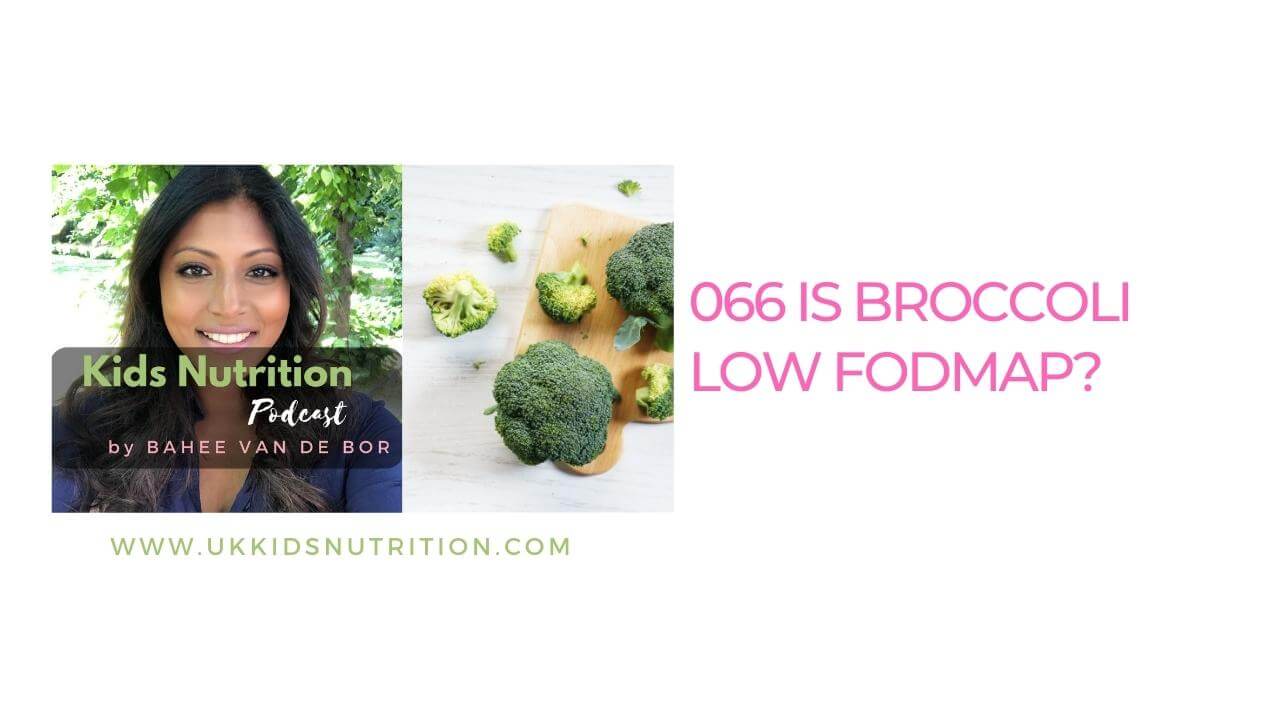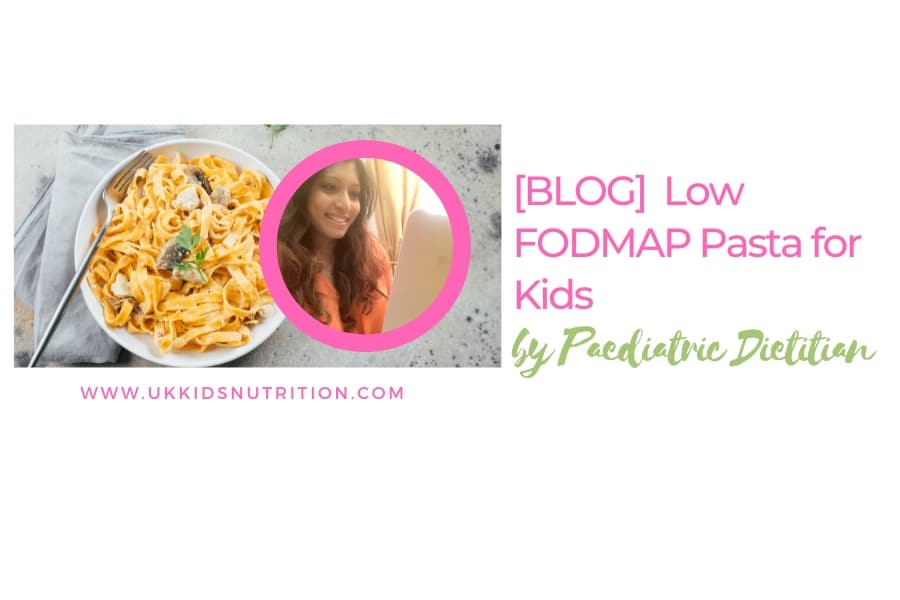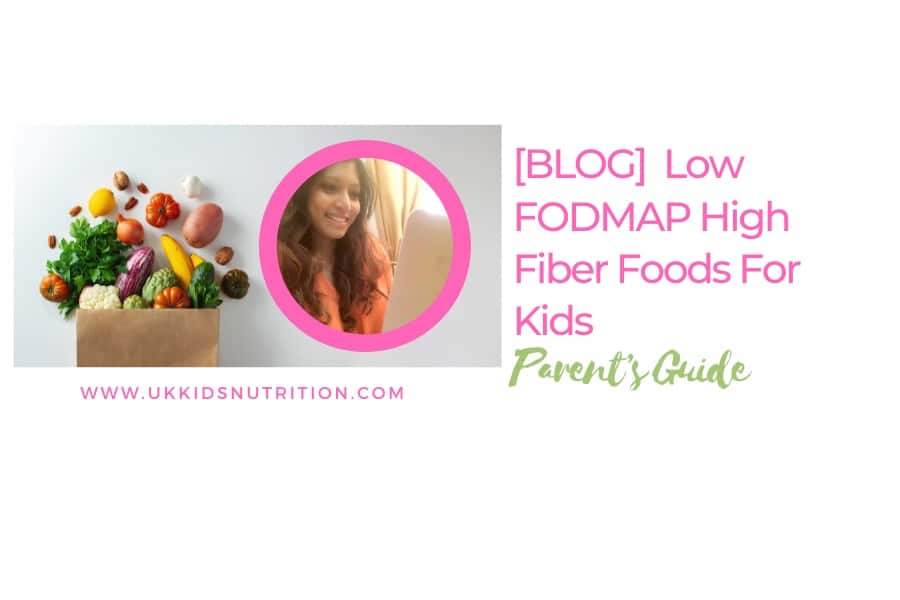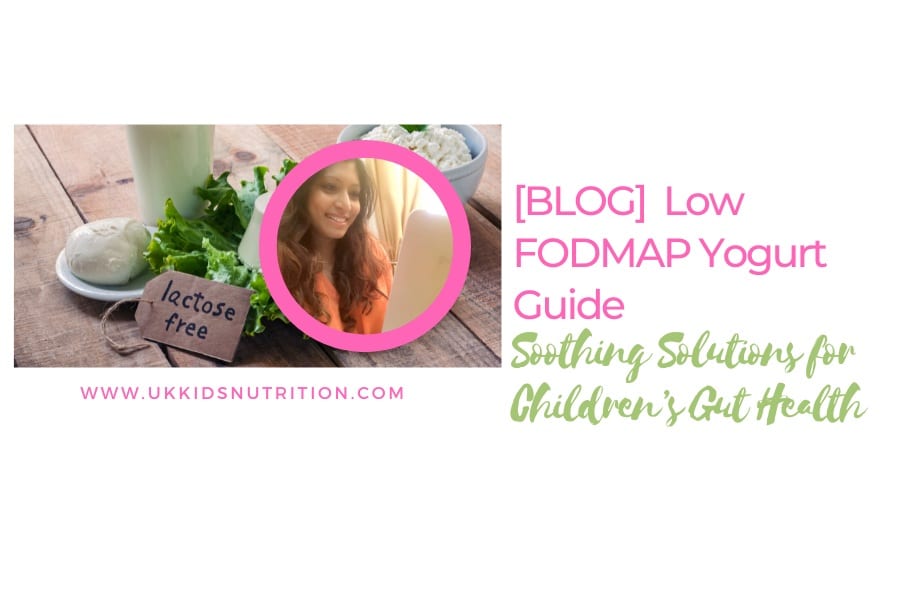Subscribe: Apple Podcast | Email | Spotify | Stitcher
Do you find yourself pondering over the produce aisle, wondering, “Is broccoli low FODMAP? Can this green, nutrient-packed vegetable be a part of my child’s diet?”
Are you on the lookout for the best foods to nourish your child with irritable bowel syndrome (IBS)?
With so much conflicting information out there, it can be challenging to decipher what’s beneficial and what’s not for your little one’s gut health.
As a paediatric dietitian, I understand these concerns deeply.
I’m here to guide you through the ins and outs of incorporating broccoli into a low FODMAP diet trial.
Let’s discover whether broccoli is a gut-friendly choice for your child.
Understanding Low FODMAP Vegetables in the Context of IBS
Before we dive into the specifics of broccoli and its role in a low FODMAP diet, let’s first understand what constitutes low FODMAP vegetables.
FODMAPs are an acronym for Fermentable Oligosaccharides, Disaccharides, Monosaccharides, and Polyols.
They are a group of carbohydrates known to trigger symptoms like bloating, diarrhoea, or constipation in both children and adults.
These compounds are found in certain fruits, vegetables, grains, and foods prepared with high FODMAP ingredients.
A diet low in FODMAPs, therefore, includes vegetables that are considered ‘FODMAP friendly’ due to their low content of these fermentable carbohydrates.
This approach is often recommended as a short-term strategy to identify triggers for symptoms like bloating, constipation, or diarrhoea.
It’s important to work with a paediatric dietitian to ensure the diet is not only effective but also nutritionally balanced.
It’s crucial to note, however, that FODMAPs also act as prebiotics, which are essential for nurturing beneficial gut bacteria.
A prolonged restriction of these prebiotic foods can negatively impact your child’s gut health and bowel habits over time.
Hence, a low FODMAP diet is generally recommended for a limited period under professional guidance.
For a deeper understanding of IBS and its relationship with diet, read ‘Kid Poop Chart & IBS Explained’.
Now let’s explore where broccoli fits into this dietary puzzle and how it can be included in your child’s meals.
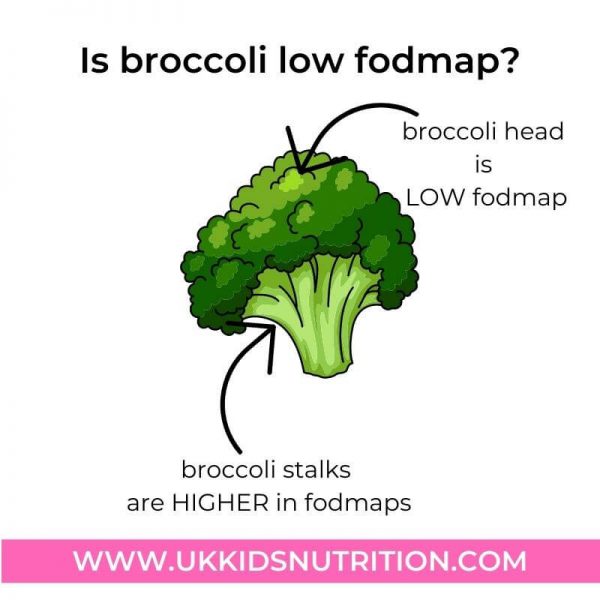
Is broccoli low FODMAP?
In managing IBS symptoms in children, diet plays a pivotal role.
A frequent query in my role as a paediatric dietitian is the FODMAP status of various vegetables.
So, let’s address this important question: Is broccoli low FODMAP?
Monash University, a leader in FODMAP research, confirms that broccoli is indeed low in FODMAPs.
This is excellent news! Broccoli is a powerhouse of vital nutrients like vitamin C and folate, a plant source of calcium and dietary fibre.
However appropriate portion sizes are important.
What part of broccoli is low FODMAP?
The FODMAP content in broccoli varies depending on the part of the vegetable consumed.
Both broccoli florets and broccoli stalks are suitable for a low FODMAP diet.
For the florets, a serving size of up to 75 grams is considered safe.
For the stalks, a slightly smaller serving of around 65 grams is advisable to maintain its low FODMAP status.
In dinner recipes, make sure that you use the whole broccoli versus specific parts like only the broccoli stalks.
Is Broccolini low fodmap?
What about variants like broccolini?
Broccolini, which is often mistaken for tenderstem broccoli, is also low in FODMAPs.
As per Monash University’s analysis, children can enjoy broccolini.
The stalks, in particular, are lower in FODMAPs compared to the heads.
As with standard broccoli, portion control is crucial in ensuring broccolini remains a gut-friendly choice.
Having established that broccoli is low FODMAP, let’s consider how it compares with other vegetables.
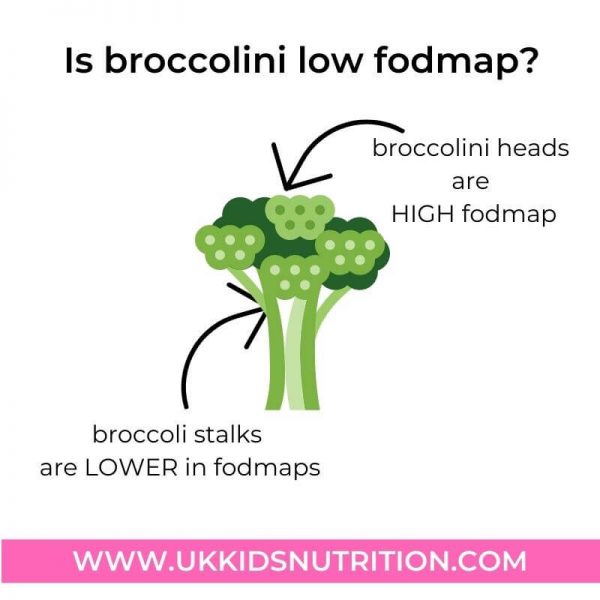
Other low FODMAP vegetables
Continuing from our discussion about broccoli in a low FODMAP diet, let’s delve deeper into how this translates into daily meal planning for IBS-friendly meals for your child.
Understanding the nuances of portion sizes and the variety of broccoli can be quite enlightening.
While we’ve established that both broccoli florets and stalks are low FODMAP in controlled portions, it’s essential to consider how these portions fit into your child’s overall diet.
For instance, combining broccoli with other low FODMAP vegetables can create a well-rounded and nutritious meal, reducing the likelihood of triggering IBS symptoms.
A colourful plate of steamed broccoli, carrots, corn and green beans not only appeals to children visually but also ensures they are getting a variety of nutrients without overloading on FODMAPs.
In summary, broccoli can indeed be a part of your child’s low FODMAP diet and snacks.
Here’s why you should offer them to children.
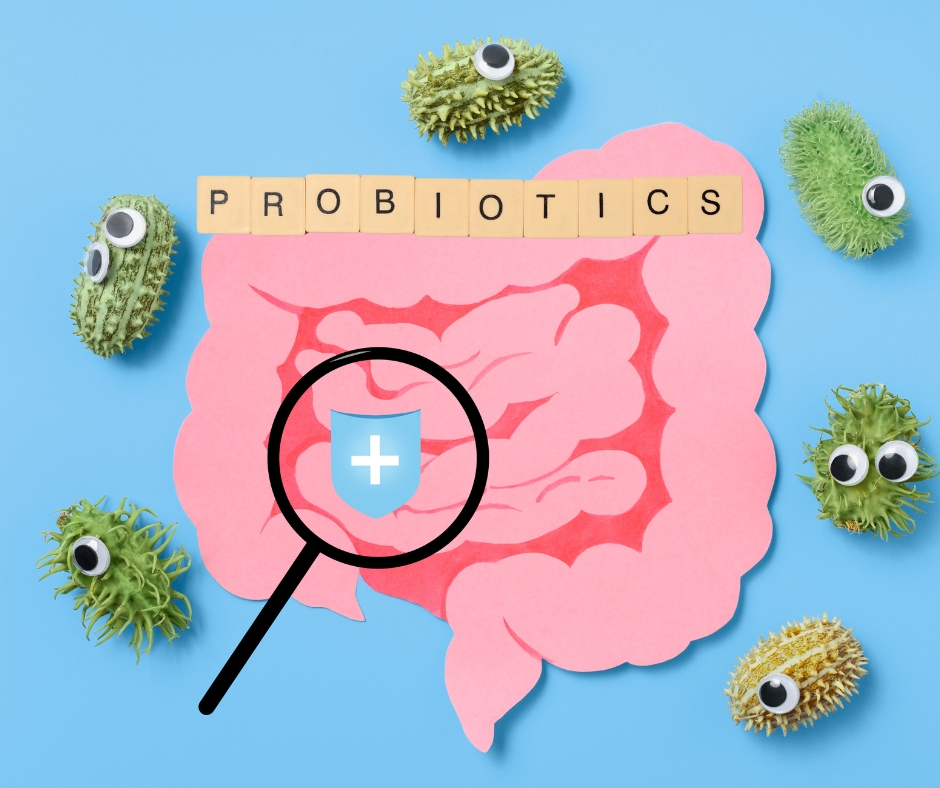
Broccoli and IBS in Children: Understanding the Benefits
For children with Irritable Bowel Syndrome, managing dietary choices can be a delicate balancing act.
While certain foods might trigger discomfort, it’s crucial not to overlook the nutritional benefits they can offer.
Broccoli, for instance, is a vegetable that merits special attention in this context.
Rich in prebiotic fibre and phytochemicals known as glucosinolates, broccoli offers significant health benefits, making it a valuable inclusion in a child’s diet, even for those with IBS.
Prebiotic fibre in broccoli plays a vital role in promoting gut health.
It feeds the beneficial bacteria in the gut, fostering a healthy digestive ecosystem, which is especially important for children with IBS.
These fibres help in maintaining regular bowel movements, which can be a concern for children experiencing IBS-related constipation.
Moreover, the phytochemicals in broccoli, particularly glucosinolates, have been shown to have anti-inflammatory properties, which can be beneficial in managing IBS symptoms.

Managing Gas and Tummy Pain: The Role of Portion Size
However, it’s common for children with IBS to experience gas and tummy pain after consuming foods high in fibre, including broccoli.
This doesn’t necessarily mean that broccoli should be eliminated from their diet. Instead, a gradual approach is recommended.
Starting with smaller portion sizes can be an effective way to introduce broccoli. It allows the child’s digestive system to adjust to the fibre content without causing significant discomfort.
As per the research highlighted here, the key is to find a balance that allows children to reap the nutritional benefits of broccoli without exacerbating their IBS symptoms.
If a child experiences discomfort after eating broccoli, it’s worth experimenting with the amount and preparation.
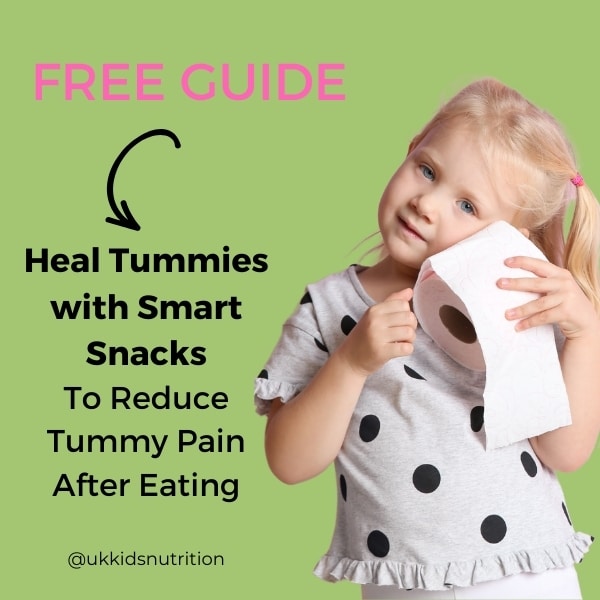
Broccoli’s Varieties and IBS: Exploring the Options
When tailoring a diet for a child with IBS, understanding the FODMAP content of different types of broccoli can be incredibly helpful.
Let’s explore the options, focusing on Chinese broccoli and purple sprouting broccoli.
Is Chinese Broccoli Low FODMAP?
Good news for fans of Chinese broccoli, also known as Gai Lan.
This leafy green has been thoroughly analysed and is confirmed to be low in FODMAPs. However, it’s crucial to be mindful of portion sizes.
For instance, if your teenager consumes more than 4 ¼ cups of Chinese broccoli in one meal, this could exceed the low FODMAP threshold.
While Chinese broccoli is a safe option for a low FODMAP diet, remember that moderation is key to avoiding IBS flare-ups.
Is Purple Sprouting Broccoli Low FODMAP?
Navigating the world of less common vegetables like purple sprouting broccoli can be a bit trickier.
Currently, there is no specific FODMAP analysis available for purple sprouting broccoli. This lack of information means caution is advised.
If your child is following a low FODMAP diet, it’s best to consult with your dietitian for personalised advice.
They can guide whether to include this vegetable in your child’s diet and suggest suitable alternatives if necessary.
In summary, while Chinese broccoli is a confirmed low FODMAP option, the status of purple sprouting broccoli remains uncertain.
Diversifying the vegetables in your family’s diet is beneficial, but always with a careful eye on portion sizes and the individual FODMAP tolerances of your child.
Cooked vs. Raw Broccoli: What’s Best for IBS?
After exploring broccoli FODMAPs, it’s also essential to consider how broccoli can be cooked for children with IBS.
This leads us to an important question: What’s better for managing IBS symptoms, cooked or raw broccoli?
Let’s delve into this to help you make informed choices for your child’s diet.
For example, cooking broccoli until it’s very soft may make it easier to digest.
For a modified FODMAP diet trial, starting with just the florets, rather than the stalks, will be a gentler introduction.
In summary, broccoli’s prebiotic fibres and glucosinolates make it a valuable food for children with IBS.
In summary, both raw and cooked broccoli have their place in a low FODMAP diet.
Cooking methods may offer additional digestive ease for children with IBS.
It’s also important to remember that broccoli’s prebiotic fibres and glucosinolates make it a valuable food choice.
While mindful of portion sizes to avoid discomfort, completely avoiding broccoli might mean missing out on its significant health benefits.
As always, consulting with an IBS-trained paediatric dietitian can provide personalised guidance.
They can help ensure your child’s diet is not only balanced and nutritious but also comfortable and enjoyable for them.

Wrapping Up: Embracing Broccoli in Your Child’s Low FODMAP Diet
As we’ve explored ‘Is broccoli low FODMAP’, it’s also important to recognize the bottom line: broccoli is a nutritious food.
Broccoli shouldn’t be unnecessarily restricted in children, even if they experience frequent loose stools with abdominal pain.
Like many IBS friendly vegetables, each part of the broccoli requires different considerations.
Some parts are higher in excess fructose, so it’s crucial to pay attention to portion sizes.
Despite this, it’s essential not to avoid broccoli unnecessarily even during a low FODMAP diet trial.
Children can still enjoy a serving size of broccoli (including all the different parts) with their meals.
This green vegetable should be viewed as a valuable source of nutrition, especially for children grappling with IBS.

Bottomline
In closing, remember that the role of broccoli in your child’s diet should be tailored to their individual needs.
If you suspect your child may have IBS, consulting with a paediatric gastroenterologist is a wise step. Additionally, for personalized dietary guidance and support, do consider enrolling in my Happy Belly Club,
Here’s to a journey of healthful eating for your little ones.
Do embrace broccoli for its high nutrition profile and health benefits.
If you struggle to include vegetables in your child’s diet due to IBS tummy pain, diarrhoea or constipation join the Happy Belly Club.
Let Me Help
Would you like to meet a children’s dietitian who has successfully helped families solve their nutrition problems from around the world?
No matter what you are worried about, I’ll help you manage these with confidence.
